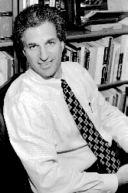
News Release
|
Office of News and Information Johns Hopkins University 3400 N. Charles Street Baltimore, Maryland 21218-2692 Phone: (410) 516-7160 / Fax (410) 516-5251 |
February 11, 1998 FOR IMMEDIATE RELEASE MEDIA CONTACT: Christine A. Rowett car@jhu.edu |
Psychologist Sees a Changing Role for
Therapists
Counselors developing a presence in schools, offices
 Mark Ginsberg thinks the role of therapy in today's society
is changing.
Mark Ginsberg thinks the role of therapy in today's society
is changing.
"The field of counseling is evolving at a very rapid rate," Ginsberg said. "What we're trying to do is to think about some of the settings and roles counselors will be practicing over the next decade."
The most significant change in the profession, he said, will most likely be the counseling done in non-traditional settings. To that end, the new chair of Counseling and Human Services in the Division of Education at the School of Continuing Studies is doing his part to prepare counseling professionals to work in a variety of different places; two of the prime examples are schools and workplaces.
"One of the ways to challenge the stigma of seeking these services is to broaden the kinds of settings that practitioners have," Ginsberg said. "So it's not just practicing in mental health and psychiatric facilities. It's bringing these kinds of technologies to settings that historically may not have offered them."
As the locations of counselors change, the roles of counseling professionals change, said Ginsberg, a Takoma Park, MD., resident. In the past, school guidance counselors may have been former teachers looking to cut back on academic work, he said, so they handled detention, study hall and scheduling. Those functions are still significant, Ginsberg said, but the responsibilities have increased. The current breed of school guidance counselors does a lot of work on behavioral issues in addition to offering career and scheduling advice. In short, they are given more responsibility for the development of students.
One masters level program in the Education Division is being offered in conjunction with the Baltimore City Schools to train people to be school counselors in urban settings. Another group is working with Baltimore County educators to offer training on how to be more proficient with students who are at risk.
"Increasingly, I think that's what we'll see in the future, more collaboration between counseling professionals and special educators," Ginsberg said. "Both professions seek to deal with some of the behavioral challenges that kids face."
More counselors are also finding jobs in workplace settings, where employers are offering a variety of mental health enrichment programs.
"Employees are often troubled by a range of issues," Ginsberg said. "What we've come to understand in organizations and workplaces is that when individuals are troubled by issues, those difficulties can affect other individuals in the unit and the unit as a whole."
Ginsberg is no stranger to promoting mental health in the workplace. From 1993 until joining the Division of Education late last year, he was the director of the Hopkins Faculty and Staff Assistance Programs, which offers referrals, counseling and crisis intervention services to employees and their families.
For more information on the Division of Education's department of Counseling and Human Services, check www.scs.jhu.edu/education/p_counsl.htm.
|
Johns Hopkins University news releases can be found on the
World Wide Web at
http://www.jhu.edu/news_info/news/ Information on automatic e-mail delivery of science and medical news releases is available at the same address.
|
 Go to
Headlines@HopkinsHome Page
Go to
Headlines@HopkinsHome Page